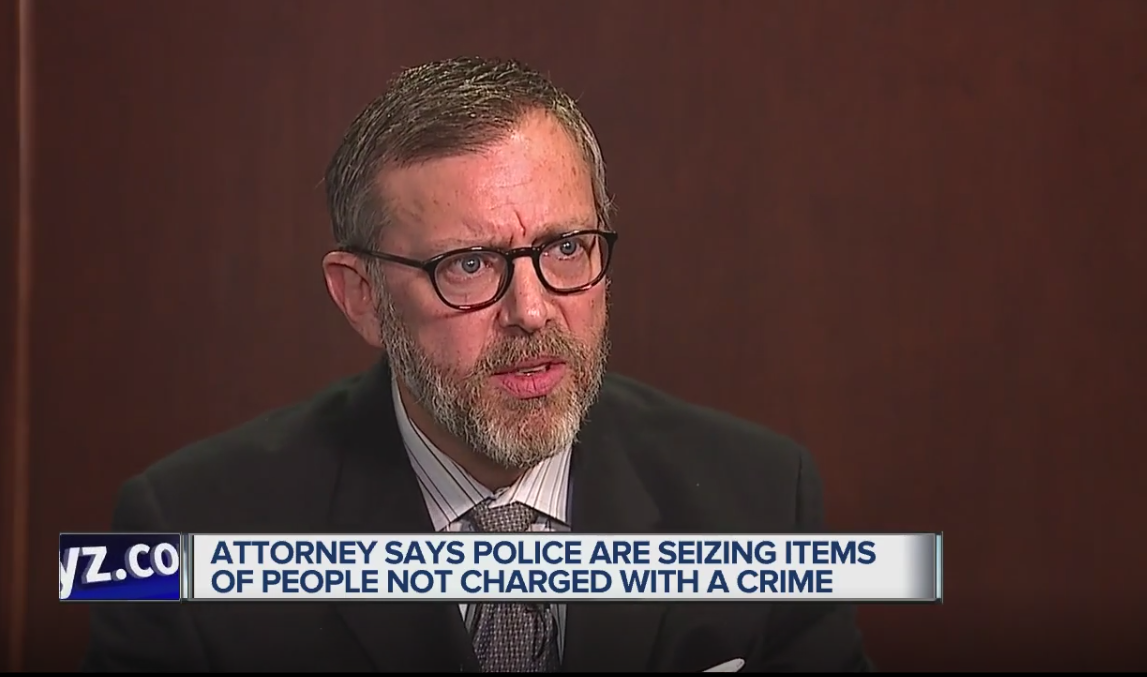
Aug 2, 2018 | Blog, News, Recent Victories
July 31, 2018 – A Judge dismissed felony charges against six people arrested in a raid of a Detroit medical marijuana grow facility.
2 months ago, the authorities raided what they believed was an illegal marijuana grow operation in Detroit.
But an attorney in the marijuana business now says all the charges have been dropped.
FOX 2 TV Report
All charges against Curtis Williams, 36; Cotea Jeanne Walsh, 37; Jones, 53; Travis Davison, 27; Jabari Currie, 31; and James Frazier, 32, of Detroit, were dismissed following a raid in the city of Detroit on May 29, 2018.

“We knew that it had to go this way. Fundamental fair play, you come to expect that to a certain degree,” says lawyer Thomas Lavigne. He represents Viola Brands, the cannabis company operating in southwest Detroit that police and federal agents raided back in May.
The Wayne County Prosecutor’s Office says the court held that the defendants, Viola Employees, operated in good faith in complying with the law and the number of plants they could have inside the building, and it was on the City of Detroit to inform them about what was required – and it failed to do so.
But a defense attorney says Viola had less than the maximum of 1,500 plants in the building and all of its affairs, from its temporary state license to its certificate of occupancy, were in order.
SEE TEMPORARY PROVISIONING CENTER LIST HERE

Judge Kenneth King of 36th District Court dismissed the case “in the interest of fairness.”
Komorn Law has represented numerous clients through the legal chaos of starting up a business in the Michigan Medical Marihuana Industry.
Contact Us For More Information.
800-656-3557

Aug 1, 2018 | Blog, News, Recent Victories
July 31, 2018 -A Detroit Judge dismissed felony charges against six people arrested in a raid of a Detroit medical marijuana grow facility.
All charges against Curtis Williams, 36; Cotea Jeanne Walsh, 37; Jones, 53; Travis Davison, 27; Jabari Currie, 31; and James Frazier, 32, of Detroit, were dismissed following a raid in the city of Detroit on May 29, 2018.

Charges included felony drug delivery and manufacturing charges, both carrying up to 15 years in prison.
Prosecutors argued that the facility on the 4400 block of West Jefferson Avenue was not licensed to grow marijuana.

(Photo: Detroit Police Department)
The Detroit Police Department’s Gang Intelligence Unit executed a search warrant at the medical marijuana facility and seized 200 marijuana plants, about $1 million worth, authorities said.
“Over 1,000” plants were found in the raid, according to the Wayne County prosecutor’s office.
Officers seized marijuana and held employees at gunpoint during the May 29 raid, according to Harrington and his partners in the Denver-based marijuana company Viola Brands.
All cannabis at the site was taken, the business’ accounts were frozen and employees’ vehicles were seized, according to the company.
A defense attorney in the case, Michael Komorn, said the facility was granted a temporary operation’s certification from the city, allowing up to 1,500 plants while the facility waited for the filing process to be approved by the city. Komorn said the Wayne County Prosecutor’s Office made the argument that the facility only was allowed to sell, and not grow, at the facility.
“That’s absurd,” Komorn said. “It’s a semantic issue because I would say everyone would understand that if they’ve been given permission to sell it, of course a medical marijuana caregivers center includes growing and cultivating marijuana.”
The grow op’s certificate of occupancy from the city stated the intent for a greenhouse at the site, and the operation holds a temporary Class C license under Michigan’s Medical Marihuana Facilities Licensing Act allowing up to 1,500 plants, said 36th District Court Judge Kenneth King.
Judge Kenneth King of 36th District Court dismissed the case “in the interest of fairness.”

“In the interest of fairness and in the spirit of always trying to do the right thing, this court is left with no other choice but to dismiss this matter,” the judge said.
King said he stayed up until 3:30 a.m. reading briefs in the case and sorting out the web of acronyms tied to Michigan’s medical marijuana law and the “seed-to-sale” tracking and tax, regulation and licensing system for marijuana growers and dispensaries that took effect late last year.
“That kind of leads me to the burning question: if you’re able to dispense but you can’t grow it, how are you supposed to get it? Where are you supposed to get it from?”
“I don’t believe the police had any malintent. The police are doing their job,” King said. “I think the real blame lies on the documents that were submitted and someone didn’t pay close attention to what the defendants were asking for.”
Komorn said King understood his argument, and said the judge responded: “That kind of leads me to the burning question: ‘If you’re able to dispense but you can’t grow it, how are you supposed to get it? Where are you supposed to get it from?’ ”
The case had been set for a preliminary exam Tuesday. King said he expected his ruling to be appealed regardless of whether it favored the prosecution or defense.
Here is a statement from the Wayne County Prosecutor’s Office:
“I have confirmed that the court granted the defense motion to dismiss the case. However, I don’t have a written opinion.
“It is my understanding that the court held that the defendants operated in good faith regarding all the provisions of the law that they knew about the class C license (1500 plants) for a grow operation. The duty was on the city of Detroit to inform them about what was required and they failed to do so.”
All charges were dismissed Tuesday July 31, 2018.
Also…Michigan voters will decide on a ballot question Nov. 6 that would legalize and tax recreational marijuana for users 21 and older. Medical marijuana was legalized in Michigan via a ballot proposal in 2008.
See the FOX 2 News Report
Komorn Law has represented numerous clients through the legal chaos of starting up a business in the Michigan Medical Marihuana Industry.
Contact Us For More Information.
800-656-3557

Apr 9, 2018 | Blog, Michigan Medical Marijuana Criminal Defense Attorney Michael Komorn, Recent Victories, Victories Project
People v VD.
BACKGROUND:
In June 2014, Defendants home in Rochester Hills was raided by police. The raid resulted in the discovery of an alleged 3,379 grams of marijuana clippings and 113 marijuana plants. The police also found digital scales. Both defendants were charged in Oakland County with manufacturing 20 or more plants and possession with intent to deliver.
Issue:
Defense brought a motion for dismissal of the case based on the belief that their actions as caregivers and patients were protected under the section 8, Medical marijuana Defense. There are three requirements necessary to prove this defense, but in this case the only contested issue is Rule 8(a)(2).
Rule:
Rule 8(a)(2): The patient and the patient’s primary caregiver, if any, were collectively in possession of a quantity of marijuana that was not more than was reasonably necessary to ensure the uninterrupted availability of marijuana for the purpose of treating or alleviating the patient’s serious or debilitating medical condition or symptoms of the patient’s serious or debilitating medical condition.
Analysis:
The main issue in this rule is determining what is “reasonably necessary” to provide the patient with an uninterrupted availability of marijuana to treat the patient’s serious or debilitating medical condition.
Each of the patients testified to the existence of their serious and/or debilitating medical conditions and to their monthly medicinal needs.
The combined needs of these registered patients was found to be approximately 14 lbs (224 ounces) per month.
It was testified to during the hearing, that out of the alleged 110 ounces of marijuana the police had confiscated, only about 4 lbs (64 ounces) of the plant were actually usable medicine.
Based on the needs of these patients the amount of usable medicine that was found in possession of the caregiver was enough to adequately supply his patients for only 8.5 days!
With respect to the 113 marijuana plants found in the Defendant’s home: Defendant testified that the next harvest would consist of 39 plants that would produce roughly 7.5 pounds (120 ounces) of usable marijuana.
The court concluded on this issue that, given the facts provided:
“the Defendants did not possess more marijuana plants than was reasonably necessary to ensure the uninterrupted availability of marijuana for the purpose of treating and alleviating the debilitating medical condition of Joseph and the patients.”
Prosecution claimed that total amount of plants and marijuana was not reasonably necessary, but backed these claims with no evidence. Instead, Prosecution tried to claim that since there was a significant portion of the plant that had to be thrown away, due to lacking medical benefits, that not all of the plant material produced is “reasonably necessary”.
The court responded to this argument unequivocally:
“common sense dictates that it was necessary for Defendants to grow enough plants, which necessarily includes growing leaves, to acquire sufficient marijuana flower or buds to provide to the patients. The fact that Defendants were essentially essentially forced to discard portions of the marijuana plant tat could not be used to treat patients does not, in this court’s opinion establish that Defendants possessed more marijuana than was reasonably necessary.”
Conclusion: The court found that the defense successfully presented prima facie evidence regarding MCL 333.26428(a)(2). Furthermore, the court found that no question of fact existed. As a result, the court determined that Defendant’s are entitled to a dismissal of their case.

Aug 24, 2017 | Blog, Criminal Defense Attorney Michael Komorn, Recent Victories, Victories Project
Komorn Law PLLC is proud to report a ruling today from the Genesee County Circuit Court.

This case involved my client’s property and all kinds of salacious allegations of really bad behavior by this property, and I mean bad stuff, like stuff you could never imagine property could actually do.
To add to the drama of all this unimaginable behavior by my clients property, the accuser was an ” entity” called FANG. The story for the last 3 years, told by the State ( the ATTORNEY’S for FANG) was that that the bad behaving property needed to be held by FANG, because it was bad behaving ( if this makes no sense, it is not supposed to).
Additionally FANG was of the opinion that because of these allegations they should be able to keep all of my client’s bad behaving property (there has been no conviction).
Today in the civil forfeiture against my client and his “allegedly evil” property the Court granted our motion for summary disposition ( no genuine issue of fact existed to which reasonable minds could differ) ultimately dismissing the forfeiture case and ordering the return of all that bad behaving property.
https://komornlaw.com/wp-content/uploads/2017/08/Komorn-Law-Victory-in-Genesee-County-170823.pdf
File this one in the category:
#PolicingForProfit
#StopTheRaids
#ForfeitureAbuse
#TrialLawyer @KomornLawMI
#DeweyRocks

Nov 4, 2016 | Blog, Komorn Law Blog, Medical Marijuana, Michigan Medical Marijuana Criminal Defense Attorney Michael Komorn, News, Recent Victories, Victories Project
DETROIT, Mich. — A judge on Wednesday heard arguments in a federal class action lawsuit filed by medical marijuana patients and caregivers against several Michigan law enforcement and crime lab officials.
The suit, filed in June, claims that because of false lab reports, prosecutors are charging people with felonies without proof, illegally arresting them and seizing assets. Four patients and caregivers are suing the directors of the Michigan State Police, their crime labs and the publicly-operated Oakland County lab and that county’s sheriff.
Chief Judge Denise Page Hood of the U.S. District Court for the Eastern District of Michigan in Detroit said she will issue an opinion and decide whether the labs’ marijuana reporting policies violate the Fourth Amendment and due process rights of the medical marijuana patients and caregivers.
Read the plaintiffs’ lawsuit here.
Read the state defendants’ motion to dismiss here.
One of the four plaintiffs, Max Lorincz from Spring Lake, testified to having hash oil, but was charged with a felony for having synthetic THC. He lost custody of his 6-year-old son to foster care for 18 months until his case was dismissed; a case and statewide scandal FOX 17 broke last year.
“The problem is, the way that the Oakland County lab and the Michigan State Forensic Science Division is reporting still would allow for arrests, still would allow for these patients and caregivers to not have immunity because they’re reporting it as something other than marijuana,” said Michael Komorn, the plaintiffs’ attorney. “And the law enforcement community, as far as we know, is still arresting people for possessing these substances.”
In court Wednesday, Defense Attorney Rock Wood with the Michigan Attorney General’s office representing the state police and crime labs’ directors, along with Defense Attorney Nicole Tabin representing the Oakland County lab’s director and sheriff, declined requests for comment. Wood argued this is not a case involving altered, hidden or destroyed evidence. Instead, the defense writes in their motion to dismiss the case:
“The MSP policy is consistent with the current national standard for testing of seized drugs and avoids speculation as to the source of chemical components unless there is zero qualitative uncertainty.”
Ultimately, the labs’ policy states that unless there is marijuana plant matter seen along with THC, scientists label it “Schedule 1 THC, origin unknown,” instead of marijuana. This is the difference between a felony, or a marijuana possession misdemeanor which patients and caregivers can be immune for under the Michigan Medical Marijuana Act.
The plaintiffs’ attorneys and their experts say that 100 percent certainty for any evidence, even DNA is not possible.
“You know that nobody’s going to go through the trouble of synthesizing THC, along with other cannabinoids,” said Timothy Daniels, another attorney representing the plaintiffs. “And therefore you know to almost a 100 percent, and I won’t say 100 percent, let’s say 99 percent certainty, that is marijuana, not synthetic.”
Overall, the Michigan Medical Marijuana Act protects licensed patients and caregivers from charges and prosecution for having limited amounts of usable marijuana, not THC with an unknown origin. It’s this lab policy the suit is working to stop.
“It’s a little troubling that the defense is still suggesting their reporting practices are honorable,” said Komorn.
Statewide, as crime labs continue to report THC and marijuana in ways that many call controversial, the decision now rests in the judge’s hands. It’s a decision that could potentially reopen hundreds of cases across Michigan.
Meanwhile, recently passed legislation now legalizes medical marijuana patients and caregivers use of marijuana extracts like oils and edibles. The defense argued the lawsuit is moot in part due to this, however the plaintiffs’ attorneys stand firm that people continue to be unlawfully arrested, charged, and prosecuted for possession of extracts due to the labs’ reporting policy.

Oct 30, 2016 | Blog, Marijuana Criminal Defense Attorney Michael Komorn, Medical Marijuana, Recent Victories, Victories Project
A Michigan State Police lieutenant’s decision to destroy more than 500 marijuana plants without a judge’s order has led to dismissal of felony charges against two defendants.
Inspector James Wolf, the former lieutenant/commander of the Western Wayne narcotics unit, testified at a hearing Thursday that he destroyed the plants because they were rotting and had become a health hazard.
Livingston County District Judge Carol Sue Reader expressed surprise that a law enforcement veteran was unaware he had to receive a judge’s order to destroy the 556 large, tree-size plants seized in a Western Wayne Narcotics and Criminal Investigations Unit’s investigation in 2015.
“I cannot believe an officer who has been in the (Michigan) State Police for 27 years would not have known about these steps,” she said. “It wasn’t taken in this case so the court order never got issued. It would be like going in and searching a house without a search warrant. …
“I don’t think (the officer) can complain the health, molding and everything is why he did it,” Reader said. “The judge should have been the one who issued the order.”
Reader dismissed multiple manufacture marijuana counts lodged against Darryl Scott Berry of Howell Township, and codefendant Jeffrey Allen Michael of Fowlerville.
However, Berry still faces a charge alleging he delivered marijuana to an undercover officer in October 2014. The attorney general’s office said the marijuana related to that count was not destroyed. The defense believes it was and expects that count also will be dismissed.
Michael remains charged with one count alleging he possessed marijuana found in his home as well as felony firearms.
Berry and Michael return to Reader’s Howell courtroom on Jan. 20 for a preliminary exam on the remaining counts.
Assistant Attorney General Paul Cusik told the court his office may file a motion asking Reader to reconsider her decision as well as to amend the felony complaint to delivery of marijuana allegations.
During a hearing Thursday, Wolf testified that the marijuana plants seized Sept. 28, 2015, were stored at two warehouses and, despite officers’ attempts to dry out the plants for preservation, they became a health hazard.
“We could not keep up with removing the water, the moisture from the plant, and they were decomposing,” he said. “The plants were rotting and molding. … We weren’t able to preserve them.”
Wolf said he contacted his supervisor as well as Cusik, who advised that “he could not tell me to destroy evidence.” Wolf said he then made the decision himself to destroy the seized marijuana plants because it was a health hazard.
The plants were destroyed about three days after the seizure.
On cross examination, defense attorney Michael Komorn, who represents Berry, asked Wolf if he was familiar with a Michigan law that states a court order is needed to destroy evidence.
“Not until reading your motion,” Wolf replied.
Cusik argued the evidence is not destroyed because scientists with the Michigan State Police crime lab took “a sample” from each plant seized at Wolf’s request during the execution of the 2015 search warrants executed at five properties in Livingston County. Court documents show police seized an estimated 545 plants.
This step to preserve evidence, Cusik argued, showed officers acted in good faith.
“There is not any destruction of evidence,” he said. “… There are lab reports on the samples, which have been preserved.”
Officers also seized about 15 pounds of marijuana, 7 pounds of processed marijuana and suspected marijuana edibles, and more than $195,000 in cash, according to court documents.
Komorn argued the state acted in bad faith and violated his client’s due process. He said there is no way for the defense to confirm how badly, if at all, the plants had decomposed because there is “no description, no report, no additional photos” to prove what police claimed.
“We’re asserting my client was under the amount allowed and protected under immunity” in the Michigan Medical Marihuana Act, Komorn said.
“The state says no. How do we argue that? We have to accept their word? We’re going to resolve it by trusting the prosecution and investigating officers … and forensic scientists who have no training in collection of evidence?” he asked. “Their job is to analyze, not collect the evidence. … There was clearly an intention to destroy (the marijuana plants) from the outset.”
Two of the codefendants earlier entered plea deals and are awaiting sentencing.
Contact Livingston Daily justice reporter Lisa Roose-Church at 517-552-2846 or lrchurch@gannett.com. Follow her on Twitter @LisaRooseChurch.









